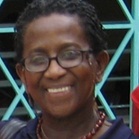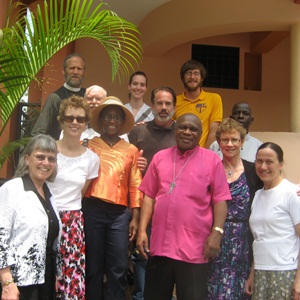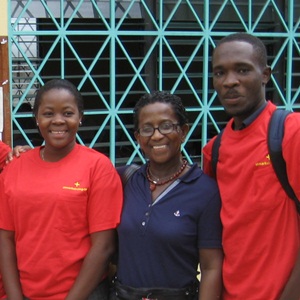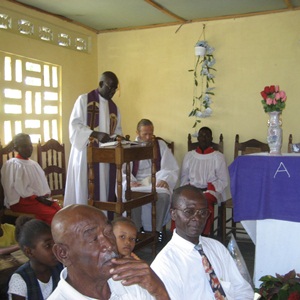The Bishop Tharp Institute, Les Cayes, Haiti – Partnership Visit ( March 2012)
 As a member of a partnership team, I undertook a trip to Les Cayes, Haiti, from 22-27 March 2012. The team consisted of the rector and several parishioners from The Episcopal Church of the Epiphany, Atlanta, Georgia; parishioners from St. Thomas Episcopal Church, McClean, Virginia; and myself, from St. Mark’s Episcopal, Irving, TX.
As a member of a partnership team, I undertook a trip to Les Cayes, Haiti, from 22-27 March 2012. The team consisted of the rector and several parishioners from The Episcopal Church of the Epiphany, Atlanta, Georgia; parishioners from St. Thomas Episcopal Church, McClean, Virginia; and myself, from St. Mark’s Episcopal, Irving, TX.
St. Mark’s has contributed to the Bishop Tharp Institute (BTI) in the form of scholarships to students for the academic years 2010 and 2011. In November, 2010, Pere Kessner Ajax, the Director of the BTI visited St. Mark’s in order to provide information on the BTI and to explain the role of this community college in educating the youth of Haiti.
 With Haiti’s youth representing some 50% of the population, education remains a top priority. The Diocese of Haiti runs the Bishop Tharp Institute (BTI) in Les Cayes. Pere Kesner Ajax, the Director of BTI, was our host during the visit. Pere Ajax directs the Partnership program for the Diocese of Haiti, in addition to running the BTI. He is also rector of Ascension Church in Beraud, a small village about 30 minutes outside of Les Cayes.
With Haiti’s youth representing some 50% of the population, education remains a top priority. The Diocese of Haiti runs the Bishop Tharp Institute (BTI) in Les Cayes. Pere Kesner Ajax, the Director of BTI, was our host during the visit. Pere Ajax directs the Partnership program for the Diocese of Haiti, in addition to running the BTI. He is also rector of Ascension Church in Beraud, a small village about 30 minutes outside of Les Cayes.
From the airport, we took a brief tour of Port-au- Prince, still marked by the devastation of the 2010 earthquake. There were some clusters of tents in some areas. However, for the most part, most of the rubble has been cleared. The quake was so destructive because more than three million people were jammed into a city meant for populations of 200,000 to 250,000. We drove past the site of the Episcopal cathedral, the Holy Trinity Cathedral, which was completely destroyed by the earthquake. Thankfully, a few of the historically significant murals, painted by Haiti’s best-known artists, were recovered.We left for Les Cayes on the day of our arrival and spent three days at the BTI.
The devastation of the earthquake did not affect Les Cayes, so there is little rubble. Les Cayes is Haiti’s third largest city, situated in the southwestern corner, with a population of some 45,900 people. Haiti’s higher education system was severely impacted by the 2010 earthquake. Twenty-eight of Haiti’s 32 major universities were completely destroyed and the four remaining universities were severely damaged. Located in the center of the city of Les Cayes, BTI consists of a clean, well-built compound of classrooms and an administration building that contains a copy center serving not only the needs of the BTI, but also the businesses of the city.
 The Bishop Tharp Business and Technology Institute (BTI) opened in September 2005. The school had been a two-year school, offering training in English, statistics and computer skills.With the devastation in Port-au-Prince, BTI is converting to a four-year school. Students hope to find simple jobs in local businesses, as tellers in banks, or repairers of electrical equipment at the end of the two-year program. The four-year students, however, move on to classes like “Making a Business Plan” or “Entrepreneurship” and they hope to start their own businesses.
The Bishop Tharp Business and Technology Institute (BTI) opened in September 2005. The school had been a two-year school, offering training in English, statistics and computer skills.With the devastation in Port-au-Prince, BTI is converting to a four-year school. Students hope to find simple jobs in local businesses, as tellers in banks, or repairers of electrical equipment at the end of the two-year program. The four-year students, however, move on to classes like “Making a Business Plan” or “Entrepreneurship” and they hope to start their own businesses.
During three days of our planned program at the BTI, members of the team offered workshops in business ethics, project management, business communications and presentation skills. I provided an overview of the role of international organizations in development assistance and touched on the need for greater cooperation among such efforts, especially those of non-governmental organizations (NGOs), an area that posed some concern for many of the students.
On Sunday, we attended worship at l’Eglise de l’Ascencion situated in Beraud, a small village inland and west of Les Cayes. Ascension Church in Beraud regularly holds about 100-120 worshipers on a Sunday. Since 80% of the primary education in Haiti is provided by the churches of the country, the church also sponsors a school with 54 students. Pere Kesner Ajax intimated that plans were underway to host the children of the parish at the BTI for a week-long summer Vacation Bible School. Haiti is a constitutional republic with a population of approximately 9.9 million. The country has a multiparty political system and recently held Presidential and legislative elections on November 28, 2011.
 Haiti does have a large, successful professional class – entrepreneurs, doctors, lawyers, teachers and administrators – but alas they live, for the most part, in NewYork, Miami, Boston, Canada and other cities abroad. According to theWorld Bank, 83% of the qualified Haitians live in the United States, and overseas. The efforts of the Bishop Tharp Institute (BTI) to encourage students to study and remain in their home country are therefore commendable and could serve to provide the vital skill-sets needed to rebuild Haiti.
Haiti does have a large, successful professional class – entrepreneurs, doctors, lawyers, teachers and administrators – but alas they live, for the most part, in NewYork, Miami, Boston, Canada and other cities abroad. According to theWorld Bank, 83% of the qualified Haitians live in the United States, and overseas. The efforts of the Bishop Tharp Institute (BTI) to encourage students to study and remain in their home country are therefore commendable and could serve to provide the vital skill-sets needed to rebuild Haiti.
In exchanges with the BTI students, most of them are convinced that a business career represents a sure outlet to a stable financial future. They would relish more training in such areas relating to technology, to business plan writing and development of financial proposals. The students were especially impressed with the advice provided by one of our team members in his presentation on business ethics, when he encouraged them to be the kinds of employees that they themselves would wish to hire.
It was evident from our trip that the Haitian people continue to appreciate the vital role that the Episcopal Church fulfills in their lives as a constant presence serving both their spiritual and social needs. The Diocese in Haiti is the largest diocese within the Episcopal Church (which serves Haiti, the United States, and 14 other nations). The Bishop of Haiti is the Right Reverend Jean Zaché Duracin, who was elected in 1994. One of the highlights of our visit was an audience with Bishop Duracin at the Episcopal diocese in Port-au-Prince. I am ready to talk with any of my fellow parishioners who may be interested in more detailed information on the impressions gained. Trust you are all prepared to join me in the months ahead as we discern how and if St. Mark’s is prepared to maintain some kind of relationship with the BTI.
Your Servant,
Paulette
Paulette, this is wonderful! The BTI appears to be on the same path as Uganda Christian University where I work to support students and development. No doubt the BTI is changing lives…saving lives.